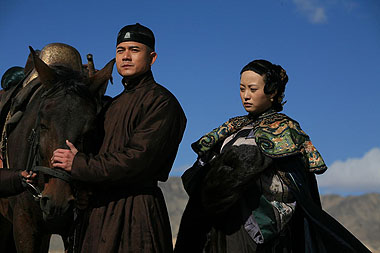Taiwan tycoon Terry Guo has a special affinity for Shanxi Province as his parents lived there before they went to Taiwan in 1949. His roots inspired his first invested film, "Empire of Silver."
Ranked 142 on Forbe's Magazine's 2007 list of the world's richest people, Guo lavished 67 million yuan (US$9.8 million) on the film about a family of bankers in Shanxi.
It is said that he originally wanted to make a film of the epic novel "White Deer Plain," about three generations of peasants struggling on the Shanxi plain. But he decided to make his maiden film about a subject he knew better, one related to his family background..
|

|
|
The hero played by Aaron Kwok and the heroine played by Hao Lei [Shanghai Daily] |
It will start screening nationwide on July 30.
The film, adapted from a romance trilogy "Valley of Silver," tells the story of the prosperous Kang family of bankers in Shanxi. The family ran the "Wall Street" of late Qing Dynasty (1644-1911) and early Republic of China and controlled the nation's finances by managing money transfers and funds. Unfortunately, the Wall Street parallel is not well developed.
The family goes through the Boxer Uprising. The Qing Dynasty was greatly weakened, and was eventually overthrown by the 1911 revolution.
The patriarch's concept of business management and that of his third son, wholly unfit for business, are world's apart and reflect the dramatic changes in Chinese society. The old man is determined to turn his son into a ruthless businessman in his own mold, but the son resists his father's authoritarian style and tyrannical principles.
The tension between the two men is heightened by the son's love for his beautiful young stepmother, his first and only love before his father stole her. To avoid emotional conflict, the woman flees, alone, to America.
Confronting social turmoil and the decline of the family business, the son must decide whether to follow his father's path or make his own way in life.
"Empire of the Silver" was invited to the special section of the Berlin Film Festival this year, probably because it touched on a financial crisis in China long ago, resonating with the current global turndown. It garnered no award at Berlin.
It is the first feature film of Christina Yao, a veteran stage director in Taiwan.
Though the female director gets it right when it comes to properties, costume and music, she lacks the film directing experience to tell a complicated story of historical significance. The scenes are not well connected and the pace is slow.
At times viewers feel the director cannot thoroughly express what she wants to say, perhaps due to time limitations.
The role of the son is played by Aaron Kwok, winner of the Best Actor awards in Taiwan's Golden Horse Film Festival in 2005 and 2006. His performance compensates somewhat for the shortcomings of the script.
The beautiful stepmother is played by Chinese mainland actress Hao Lei, the subject of controversy for her full frontal nudity in Lou Ye's 2006 film "Summer Palace." It was the first such scene in a mainland film, which was banned.
Guo himself selected Hao for the role but her performance is less convincing than that of the free-spirited girl in "Summer Palace;" traces of that character can be found in her latest performance.
The film doesn't stint on special effects produced by teams from the UK, Japan and Thailand, but the only impressive scene occurs when the son faces a pack of wolves at night in the desert.
At the end of the film the son decides to use the family's wealth accumulated over centuries to pay its debt to ordinary small clients at their bank. The decision almost bankrupted the family and the son anguished over it, but then discovered a message left by his forbears, together with a mound of silver: "righteousness."
Oscar-winning composer Su Cong makes an important contribution to the film that is in most respects disappointing.
(Shanghai Daily June 18, 2009)